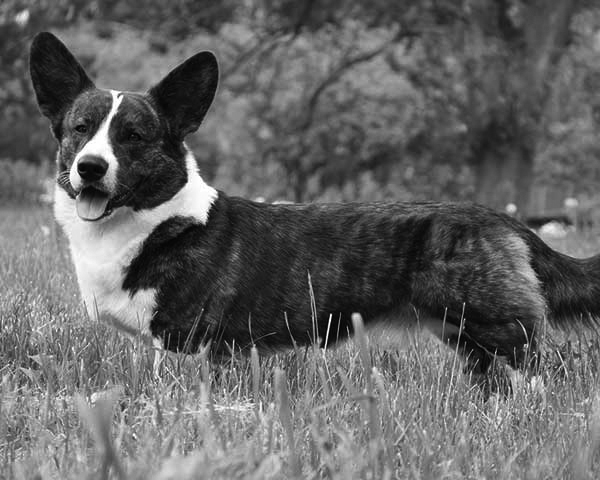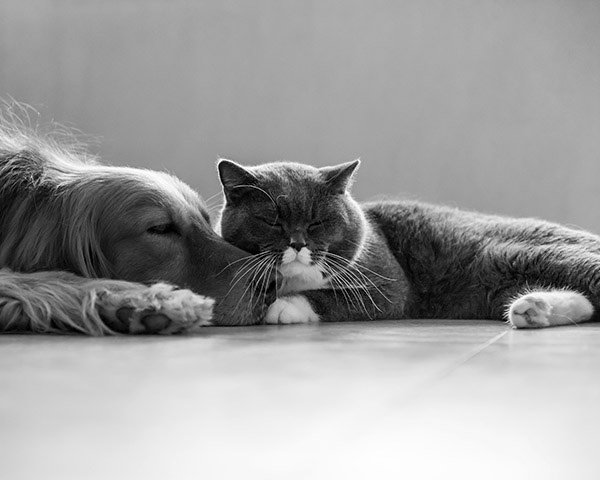Cardigan Welsh Corgi dog breed information and advice
Welsh Corgis have a distinctive look, with large heads, heavy long bodies and short thick legs. There are two types of Corgis: the Pembroke and the Cardigan. This dog breed guide will help you to understand the difference between the two. And if you’re looking to welcome a Cardigan Welsh Corgi into your home, this guide has lots of useful information on how to care for your Corgi, including grooming, feeding, exercising, and training tips.
Cardigan Welsh Corgi facts

| Lifespan | 12 - 15 years |
| How much | £800 - £1800 |
| Size | 30 cm |
| Weight | 13 - 17 kg |
| Colours | any colour with or without white markings. Most common colours are brindle, black and white with brindle or tan, red and sable with white markings, and blue merle |
| Grooming | weekly |
| Temperament | loving, obedient, intelligent, friendly, independent |
| Exercise | 60 minutes daily |
Cardigan Welsh Corgi insurance
Like with any other dog, getting pet insurance for your Cardigan Welsh Corgi can be a great help if something goes wrong. After all, when it comes to pets, anything can happen – and you want to make sure you’re covered against illness or injury. Insuring your dog means you’ll get help paying for its health care, including things like consultations, medication and surgery.
Sainsbury’s Bank Pet Insurance
With Sainsbury's Bank Pet Insurance we can insure your Cardigan Welsh Corgi from as young as 8 weeks old.
How to care for a Cardigan Welsh Corgi
Caring for a dog isn’t always straightforward and can take a lot of effort. Your dog’s diet and exercise affects their health with obese and underweight dogs being more prone to health issues. Grooming and training are also important aspects of your dog’s health care. Knowing how to care for your Corgi in these key areas will keep you both happy.
Feeding and nutrition
Cardigan Welsh Corgi puppies need to be fed small amounts 3-4 times a day. As they grow and their needs change, change it to twice a day. Cardigan Corgis have high exercise demands and their food fuels their adventures. So it’s best to feed them in the morning and the evening.
Be wary of overfeeding; it’s easy for Cardigan Welsh Corgis to become obese because of their build. And an obese dog is more likely to develop health problems, especially musculoskeletal symptoms, due to the extra weight on their joints. Check the packaging and measure every feed to make sure you’re giving your Cardigan Corgi the right amount.
Grooming
On the dog grooming scale, Cardigan Corgis are relatively low maintenance. They have a thick double coat that sheds all year round, but mostly during spring and autumn. Fortunately, you just need to give them a weekly brush to keep on top of it. They can be quite adventurous and aren’t afraid to get wet and muddy, which means bath time. Unless they’re particularly dirty, they should only need a bath every 4-6 weeks though.
Your dog’s nails will need trimming every 4 weeks to stop them from curling round and becoming painful. Make sure you’ve been shown how to do this before attempting it. And beware; a dog’s claw has a ‘quick’ within that will bleed if cut.
Exercise
Cardigan Welsh Corgis were bred to lead cattle, and as a working breed they’re used to lots of exercise. Your dog will need 60 minutes of exercise daily, which can be split into multiple walks or one long hike. You can also add playtime into the mix for additional exercise.
Training
Cardigan Welsh Corgis have an obedient temperament. They’re also are intelligent and quick learners, which makes them easy to train. Hopefully your Corgi puppy will have started their puppy toilet training with the breeder, making house training much easier. When you get them home, give your dog plenty of chances to go to the toilet outside, even if they haven’t asked to go out. They will soon learn where they’re supposed to toilet and start to ask to go out when they need it.
Temperament and behaviour
Cardigan Welsh Corgis love people and are happiest in your company. This also means that they don’t like to be left alone for long. Puppies and dogs can suffer from separation anxiety; get them used to being away from you by building up your time apart gradually. Start with a few minutes and build from there. It can help to make sure they have plenty of toys to play with.
Cardigan Welsh Corgis have a laidback personality, but whatever you’re doing they’ll want to take part, especially if it involves lots of exercise. Their big ears make them excellent watchdogs, and the slightest noise can set them off, so you’ll need to get used to them barking quite a bit. On the plus side, your home will always be protected – and with training, you can teach your dog to stop barking on command.
Corgis were originally bred for herding cattle, nipping and barking at the cattle to get them to move. You might find that they do the same to humans if not properly trained. This is something worth bearing in mind, especially if you have young children.
Common health problems
A change in your dog’s behaviour could be a sign that they’re suffering from a health problem. Cardigan Welsh Corgis are generally healthy, but there are some conditions that you should be aware of. Take your dog for regular vet health checks so any problems can be detected and treated at an early stage. If you’ve taken out pet insurance for your Cardigan Welsh Corgi, this should help cover the cost of most treatments, including consultations, medication and any surgery they might need.
Intervertebral disc disease (IVDD)
Intervertebral discs are shock absorbers in the spine. IVDD sufferers have weakened discs that aren’t able to do their job properly. This can lead to disc herniation or spinal cord compression, which will cause pain to the dog. Affected dogs will hang their head low and hunch their back. Shivering, panting and difficulty or reluctance to move are other common symptoms. Dogs with mild symptoms could recover with cage rest and pain medication, but in most cases they need surgery.
Progressive retinal atrophy (PRA)
PRA is an untreatable condition that will cause your dog to go blind. Affected dogs will develop poor vision at night and become cautious about going outside. Their vision will gradually get worse over months or years. Typically, it starts when the dog is 3-8 years old. Fortunately, dogs adapt well to change and can live long and happy lives without sight. But the condition can be passed on genetically, so dogs with PRA shouldn’t be used for breeding.
So, is a Cardigan Welsh Corgi right for you?
This dog breed is an all-rounder, perfectly suited to everyone. They are serious yet funny, adventurous yet settled, loving but still independent. They don’t let their short height stop them from enjoying walks, travel and new experiences, but they also love to be at home cuddled up on the sofa. They make loyal companions that will follow you everywhere. What more could you ask for?
What’s the difference between a Cardigan Welsh Corgi and a Pembroke Welsh Corgi?
These two Welsh Corgi breeds are similar in appearance and personality, but they are two separate breeds. The Cardigan is over 2000 years older than the Pembroke, bred in Cardiganshire in southwest Wales. Pembrokes were bred in Pembrokeshire in southern Wales. Cardigans have a fox-like tail and rounded ears, whereas Pembrokes have a docked tail and pointed ears. Cardigans also have a curvier, more rounded body.
Do Cardigan Welsh Corgis shed?
Yes, they do shed. They have a thick double coat that needs to shed to regulate their temperature with spring and autumn being the high shedding seasons. Weekly brushing will help to remove the loose fur, but you’ll still need to get the hoover out regularly.
Do Cardigan Welsh Corgis bark a lot?
Welsh Corgis were bred to herd cattle and to protect the farmland by alerting their owners to any intruders. This means they are prone to barking at any unexpected sounds. Barking can be controlled with consistent training, starting when your dog is a puppy.

Browse our guides
Choose from our list of helpful guides and information

Explore dog breeds
Find out how to keep your dog healthy and happy

Cat breed guides
How to care for your cat, common health problems and more
References
Content provided from Vetstream's Vetlexicon Canis - www.vetstream.com/treat/canis 
Vetstream ltd (online) Welsh Corgi: Cardigan. In: Vetlexicon Canis. Vetstream Ltd, UK. Website: https://www.vetstream.com/treat/canis/breeds-pages/welsh-corgi-cardigan. 
Brooks D E, Williams D L & Gould D (online) Retina: generalized progressive retinal atrophy. In: Vetlexicon Canis. Vetstream Ltd, UK. Website: https://www.vetstream.com/clinical-reference/canis/diseases/retina-generalized-progressive-retinal-atrophy. 
Vetstream Ltd (online) Progressive retinal atrophy Owner Factsheet. In: Vetlexicon Canis. Vetstream Ltd, UK. Website: https://www.vetstream.com/clinical-reference/canis/owner-factsheets/progessive-retinal-atrophy-(pra). 
Bagley R & Garosi L (online) Intervertebral disk: type 2 herniation. In: Vetlexicon Canis. Vetstream Ltd, UK. Website: https://www.vetstream.com/treat/canis/diseases/intervertebral-disk-type-2-herniation. 
Vetstream Ltd (online) Intervertebral disk herniation or slipped disc Owner Factsheet. In: Vetlexicon Canis. Vetstream Ltd, UK. Website: https://www.vetstream.com/treat/canis/owner-factsheets/intervertebral-disk-herniation-or-slipped-disk. 
Terms and conditions
Important information
Sainsbury's Bank plc, Registered Office, 33 Charterhouse Street, London, EC1M 6HA (registered in England and Wales, no 3279730) is authorised by the Prudential Regulation Authority and regulated by the Financial Conduct Authority and the Prudential Regulation Authority (register no. 184514).
Sainsbury's Supermarkets Ltd is an appointed representative of Sainsbury's Bank plc. Sainsbury's Bank plc acts as an introducer to Pinnacle Insurance Ltd who is authorised by the Prudential Regulation Authority and regulated by the Financial Conduct Authority and the Prudential Regulation Authority (register number 110866). Registered office: 4th Floor, Limelight, Elstree Way, Borehamwood, Hertfordshire, WD6 1JH. Sainsbury’s Bank Pet Insurance is arranged, administered and underwritten by Pinnacle Insurance Ltd. Sainsbury's Bank plc and Pinnacle Insurance Ltd are not part of the same corporate group.
We do not provide personal recommendations to customers.
